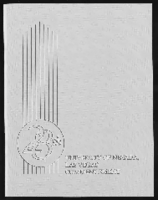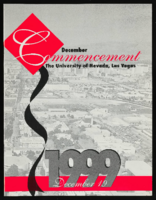Search the Special Collections and Archives Portal
Search Results

University of Nevada, Las Vegas (UNLV) 28th commencement program
Date
Archival Collection
Description
Commencement program from University of Nevada, Las Vegas Commencement Programs and Graduation Lists (UA-00115).
Text

Ashley E. Nitz oral history interview: transcript
Date
Archival Collection
Description
Oral history interview with Ashley Nitz conducted by Claytee D. White on February 6, 2018 for the Remembering 1 October Oral History Project. In this interview, Ashley Nitz discusses her experiences attending the 2017 Route 91 Harvest music festival in Las Vegas, Nevada with a friend. She talks about making the weekend of the event a "staycation", where she stayed with her friend at the Trump Hotel. Nitz goes into detail on the Route 91 Harvest festival venue and the events of that Sunday night when the shooting began. She speaks of the lockdown in the Tropicana Hotel and the support given there to all of the survivors, such as water and medical aid, as well as her journey home once the lockdown was lifted. The interview ends with a discussion on life after the shooting.
Text

Eloiza B. Martinez oral history interview: transcript
Date
Archival Collection
Description
Oral history interview with Eloiza B. Martinez conducted by Maribel Estrada Calderón on October 10, 2018 for the Latinx Voices of Southern Nevada Oral History Project. Martinez discusses the career preparedness she took while working for Commercial Credit Corporation and studying with Mayor Oscar Goodman. She then describes her first impressions of Las Vegas, Nevada and about her community involvement. Martinez then discusses her work at Wells Fargo as loan officer and assistant vice president, and talks about discrimination in the workplace and in the neighborhood where she grew up.
Text

Stavan Corbett oral history interview: transcript
Date
Archival Collection
Description
Oral history interview with Stavan Corbett conducted by Nathalie Martinez on November 5, 2018 for the Latinx Voices of Southern Nevada Oral History Project. Barbara Tabach and Rodrigo Vazquez also participate in the questioning. Stavan Corbett is a member of the Latino community who has served as an educator and politician in Las Vegas. Growing up in Las Vegas, Stavan was exposed to various environments that all helped him shape his Latino identity. Stavan was able to appreciate the Catholic and Jewish cultures as well. During the 1970s and '80s his experiences with first and second generation Latinos played a large role in his identity formation, especially as a student. He was the first in his family to graduate from high school and college. Stavan worked in the hotel industry and moved on to work with troubled youth and eventually become a member of the Nevada State Board and the Clark County School Board. His continued work with the Latin Chamber of Commerce has also allowed him to be involved with the Latino Youth Leadership Conference. Subjects discussed include: Identity Struggle, Interracial Relationships, Working in the Hotel Industry, Clark County School District, and Cultural Assimilation.
Text

Mirtha Rojas oral history interview: transcript
Date
Archival Collection
Description
Oral history interview with Mirtha Rojas conducted by Marcela Rodriguez-Campo on December 6, 2018 the Latinx Voices of Southern Nevada Oral History Project. Mirtha talks about her artistic upbringing in Cuba and how she immigrated to the Florida with her brother. She talks about relocating to Las Vegas in 2000, her membership with the Culinary Workers Union Local 226, and her employment as a guest room attendant and shop steward at the Aria Hotel and Casino.
Text

University of Nevada, Las Vegas (UNLV) 36th commencement program
Date
Archival Collection
Description
Commencement program from University of Nevada, Las Vegas Commencement Programs and Graduation Lists (UA-00115).
Text

Brendan Ly oral history interview: transcript
Date
Archival Collection
Description
Oral history interview with Brendan Ly conducted by Cecilia Winchell and Stefani Evans on March 27, 2021 for Reflections: The Las Vegas Asian American and Pacific Islander Oral History Project. Brendan discusses his background growing up in communist Vietnam in the early 1970s and fleeing with his family as refugees; they immigrated to Hong Kong, China before moving to the United States to live briefly in North Carolina before settling in California. Brendan talks about working at a young age picking fruit, working in catering, and having positions in retail before pursuing higher education and studying pharmaceuticals. He shares stories of his work experience with Walgreens and how this led to him opening a pharmacy with his brother, which they've managed together for the past 18 years.
Text

Gene Noboru Nakanishi oral history interview: transcript
Date
Archival Collection
Description
Oral history interview with Gene Noboru Nakanishi conducted by Ayrton Yamaguchi, Cecilia Winchell, and Stefani Evans on April 2, 2021 for Reflections: The Las Vegas Asian American and Pacific Islander Oral History Project. Gene Nakanishi shares his detailed family history from both his father's and his mother's families. He discusses his paternal grandfather's work on the Union Pacific Railroad, the family's internment in Wyoming during World War II, and his father's release from the camp by joining the United States Army Signal Corps. Nakanishi also talks of his maternal grandfather who was of the Bushido ("warrior") class in Osaka, Japan, and his grandfather's work with Christian missionaries. He shares details of his mother's restaurant employment in Los Angeles and her opening of Osaka Japanese Bistro in Las Vegas in 1969. Nakanishi also talks about being born and raised in Las Vegas, his musical schooling at Berklee College of Music in Boston, and his graduate education at Harvard University. He discusses his work as a band teacher for the Clark County School District, his involvement in the Idyllwild Arts Summer Program band camp, and his interests in jazz music.
Text

Mach and Arlene Manuel oral history interview: transcript
Date
Archival Collection
Description
Oral history interview with Mach and Arlene Manuel conducted by Kristel Peralta and Stefani Evans on June 28, 2021 for Reflections: The Las Vegas Asian American and Pacific Islander Oral History Project. Mach and Arlene Manuel share the story of their overseas courtship and how they came to be together in the United States. Arlene was raised in the Philippines while Mach was born and raised in San Diego, California. Mach describes his visit to the Philippines as an adult when he began to connect more to his Filipino heritage. The couple shares how they dated for 13 years before Arlene moved to San Diego, and how the Manuel family came to live in Las Vegas in 2017 to pursue Arlene's nursing career. Arlene and Mach talk about cultural differences and discrimination, emigration and diversity, religion and identity, and Filipino food, among other topics. Subjects discussed include: Manila, Philippines; discrimination of class; and anti-Asian hate.
Text

"Blacks and the Boulder Dam Project": manuscript draft by Roosevelt Fitzgerald
Date
Archival Collection
Description
From the Roosevelt Fitzgerald Professional Papers (MS-01082) -- Unpublished manuscripts file.
Text
